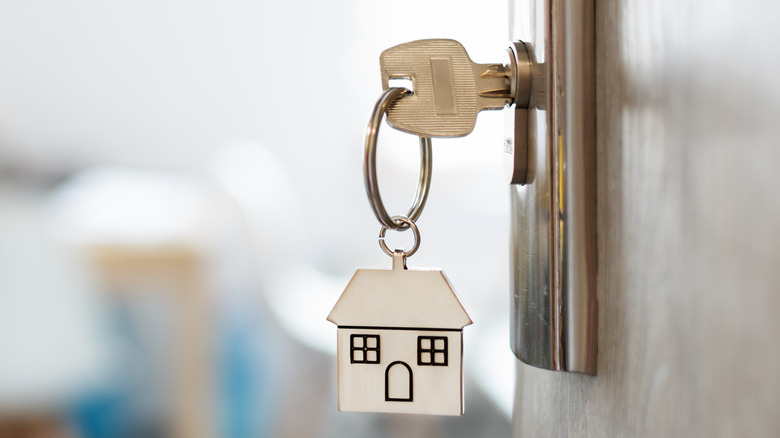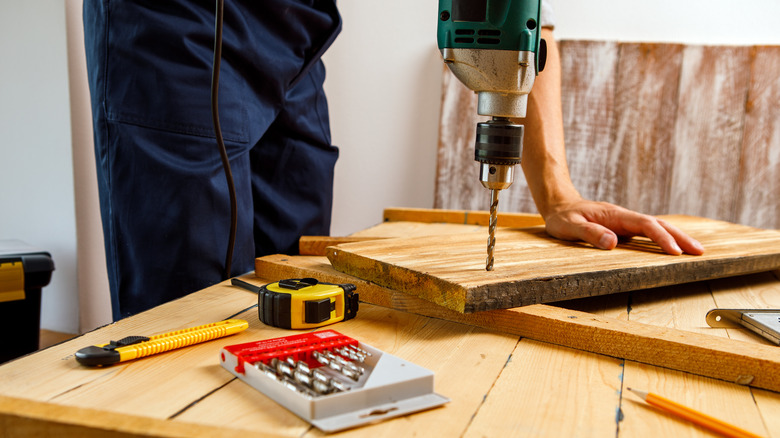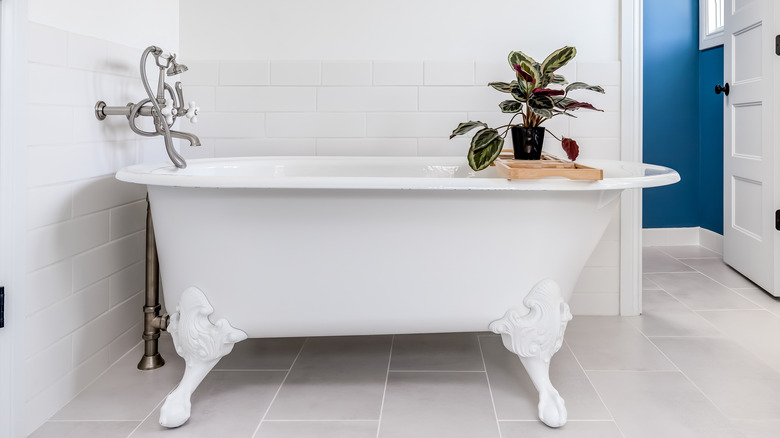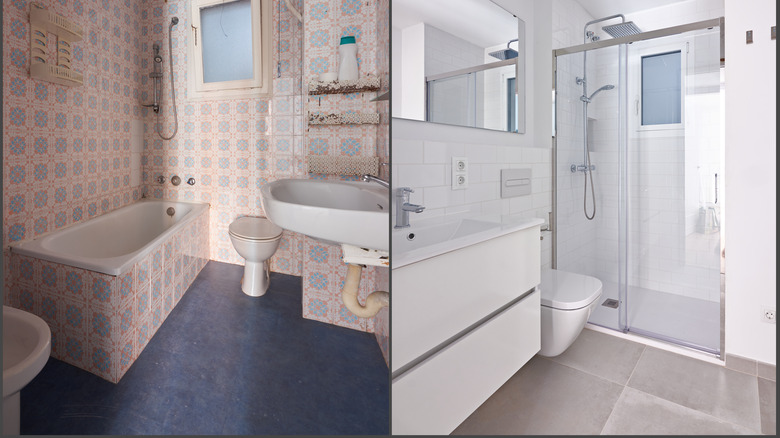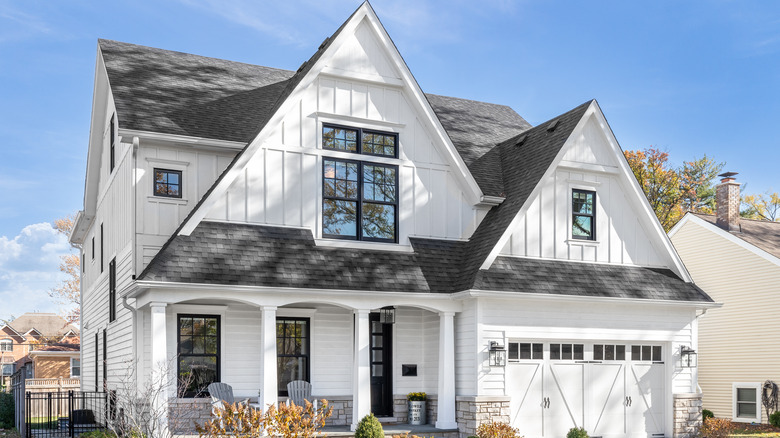How Home Renovation Shows Have Changed Homebuying Trends
The so-called "HGTV Effect" is the impact that fan favorite home renovation shows have had on the public's behaviors concerning buying and selling homes, as well as renovating them. Odell Construction Inc. reports that clients are willing now more than ever to move into a home that needs a bit of work because they've seen the renovation process on TV and are now familiar with it. Additionally, a popular Discovery+ commercial shows an eager mother taking a sledgehammer to her walls after watching a "Property Brothers" marathon. The scale of the phenomena makes perfect sense, as HGTV has been broadcasting since 1994 and now reaches over 95 million American homes each month (via The New Yorker).
The influence doesn't stop with HGTV, however, as shows that air on alternate networks like "This Old House" on PBS have also influenced how consumers view home renovation for decades. These programs have completely transformed the housing market on a large scale. Additionally, according to Architectural Digest, home improvement stores like Lowes and Home Depot have seen an increase in sales that can be directly tied to the public's interest in redesign. To that end, here are the specifics when it comes to how home renovation shows have changed homebuying trends.
Some buyers think they only get to see three houses
When you are searching for a home to buy, you can view as many houses as it takes to find one that is perfect for you. Sometimes it only takes a few showings to find a home that checks all the boxes, but sometimes it can take dozens ... and then dozens more after that. And, while it might be tiresome to do so much searching, good real estate agents are used to putting in the work to find a home that suits the buyer's specific non-negotiables.
But popular home renovation shows have changed the process for some home buyers. For example, the "House Hunters" formula is so famous that some first time home buyers think they only get to see three houses on their search, causing them to be extremely picky, according to Missouri Realtor. On the program, the real estate agent shows clients three homes and the client must choose between the three, weighing up the pros and cons of each. (But, E! News states that before filming, contestants have likely already purchased one of the homes and the other two are simply for show.) So, any buyers concerned about wasting one of their options on a home they aren't too sure about can rest easy. You can go to as many home showings as you would like.
Many buyers want turnkey homes
Home renovation shows have popularized house flipping, in which a buyer purchases a cheaper, rundown home, renovates it, then sells it for a profit, according to The Balance. To increase seller profits, these homes hit the market with new appliances, a perfectly landscaped yard, and meticulous staging, giving viewers the impression that all homes on the market should look this perfect, too (via Inman).
But it doesn't always work that way when you're buying a home that hasn't been featured on a TV show or has simply been lived in by the previous owner and not purchased with a profit in mind. But to buyers who aren't interested in doing renovations themselves, a home without a glossy presentation can be a real turn off. Buyers now often assume everything will be in perfect working order when they move in, thanks to home renovation shows, and an ugly bathroom or outdated kitchen could put them off the property entirely.
Some buyers are ready for a fixer upper
For some buyers, the successful attempts at house flipping on popular home renovation shows have inspired quite the ambitious reaction. Inman says that instead of watching shows like "Fixer Upper" or "This Old House" and thinking "I could never do that. I hope it's all finished before I move in," they instead think, "I could totally do that" and decide that putting in a little elbow grease is worth it to create their dream home.
According to Upnest, profit margins on flipping homes have decreased, but the practice has been gaining in popularity since the early 2000s. Home improvement shows have definitely inspired a generation of DIYers to grab some tools and get to work, but unfortunately, as Investopedia reminds us, not everything on TV is as easy as it looks. Even if they plan to fix up the home and live in it themselves, under-skilled home buyers who lack enough funds, time, and support can easily find themselves in a huge financial hole if they purchase a home that needs lots of renovations without enough preparation.
Homes sell faster if they have certain features
Homes with the current "in style" features sell faster than homes that do not, which Lancaster Online chalks up to the HGTV effect. The most popular example would be when the farmhouse chic style of Chip and Joanna Gaines took the world by storm after the 2013 premier of "Fixer Upper." Then in 2018, after the show's final episode on HGTV, popular real estate websites reported just how much of an impact the show had on recent home sales. House Beautiful's round up reports that homes with architectural features from the show, such as wainscoting, shiplap, clawfoot bathtubs, and barn doors, sold at an average of 30% above expected value.
That's not all, either; houses featured on "Fixer Upper" were so popular with fans that many went on to be sold and turned into rental properties, according to Country Living. So, it makes sense that if fans of the show couldn't have a home designed by Chip and Jo for themselves, that they would be interested in purchasing an abode with similar features or renting one out for a weekend getaway.
Buyers expect more for less
Viewers of popular home renovation shows who are buying in more expensive real estate markets like California and New York are often confronted with the ugly reality of sticker shock when they attempt to recreate the renovation of a home that's located in Texas. As Dianne Perry & Company note, homeowners on "Fixer Upper" must have a house with a purchase price under $200,000 and have at least another $30,000 on hand for renovations. $230,000 all in might work for the market in Waco, Texas ... but in the "Flip or Flop" market of Southern California, this is typically not even half the budget.
As the Washington D.C. based Goodhart Group notes, real estate markets around the United States can vary greatly by area, and even more greatly by cities within the area. If buyers want a more realistic idea of what to expect when purchasing a home in their local market, they should stick to shows filmed in their area. Or, better yet, speak directly to a licensed real estate agent about the current market conditions.
Buyers expect to always get the house
It's rare on a home renovation show for a buyer not to close on the house they select. However, in real life, the real estate process is rarely as easy as it is on TV. Kiplinger reminds us that shows like "Property Brothers" make it look like closing on a house take a few days at most with a couple of easy meetings here and there and a couple of forms signed. But in reality, the process takes two to three months at a minimum.
While the time frame might seem drawn out, its length is to allow buyers to obtain the financing needed to buy the home and complete any inspections required, as well as give the seller time to make any required repairs — that is, if the seller agrees and another buyer doesn't come along and undercut their offer. This happens in actual real estate deals more than you might think, as the seller can legally back out of the deal until certain paperwork is signed in most states, according to Realtor. To avoid this, most popular real estate programs tend to only invite homebuyers onto the show who already have a home under contract, even if the show makes it seem otherwise (via Fox News).
More people are trying out house flipping
Fan favorite home renovation shows like "Flip or Flop" and "Desert Flippers" have changed home buying trends for good. The programs make the process of purchasing an older home in need of major renovations, fixing it up, and selling it for a huge profit look so easy that many Americans with no prior experience in either real estate or renovation are buying "ugly" houses and trying to make a profit off them — but it doesn't always go to plan.
In fact, Vulture reports that Drew from "Property Brothers" once attempted to influence a couple into purchasing a home needing major renovation over a home that was more move-in ready by saying, "What's worse: getting your hands dirty with a fixer-upper or having to overleverage and get tied up in a mortgage for a hundred years?" Vulture even goes on to argue that the trend started by "Property Brothers" and this kind of thinking could even push the American real estate market towards another 2008 collapse. There might be some truth to that claim, as The New York Times reports that after the 2008 housing crisis, home renovation networks like HGTV heavily altered programming lineups to avoid agitating the public's fresh wounds.
Buyers set unrealistic renovation expectations
Amid the rise in popularity of house flipping, many buyers have unrealistic renovation expectations due to fan favorites like "Love It or List It" and "Property Brothers." These programs show extreme transformations, occasionally going as far as total knock down rebuilds that take months on end to complete, coast easily from start to finish in only one episode. But, as The American Genius reports, real life renovations are nothing like on TV.
The magic of TV editing tends to leave out most of the hard work and late nights that contractors put in. It doesn't show the painstaking work of cutting tile correctly (per Home Depot) when you don't have a professional team of contractors at your disposal or just how expensive home renovations can actually get (via CNBC).
Everything always works out on home renovation shows, so most buyers who plan to renovate their new house assume that it will all pan out for them, too. But while it is true that things can work out, it's often for about 50% more money than you might think, as per CNBC.
Homes must now be perfectly staged
Popular shows like "Staged to Perfection" and "Designed to Sell" have heavily influenced what buyers look for when they attend a house showing. Since these programs soared to popularity, both buyers and sellers alike think a home has to look perfect to even be considered, according to Missouri Realtor. But, sellers can use this to their advantage because even if they do not have a perfectly remodeled modern kitchen, or big sliding barn doors leading to the master bathroom, they can still help buyers imagine themselves in the space.
A survey from the National Association of Realtors suggests that 40% of buyers are impacted positively by a well-staged home and only 6% say staging doesn't make a difference, as per Moving.com. The same survey states that a well-staged home can raise its value by up to 5%. Staging helps buyers better understand how to use a space once it's theirs, and sellers are then able to sell their homes more quickly, so it's definitely a positive trend to come out of home renovation shows.
Buyers are looking for the 'worst house in the best neighborhood'
Popularized by Chip and Joanna Gaines on their smash hit "Fixer Upper," the phrase has been around for decades, but is now widely used and considered a big motivating factor when buying a house. According to Vulture, due to popular home renovation shows, buyers are more willing to invest in a home's location over its current physical state because that can always be fixed up later on.
Of course, there are plenty of home buyers who expect a perfectly renovated, fully staged home. However, for buyers already interested in DIY projects, sprucing up a home in need of a little TLC is more of a reality than dream, as the shows simply serve as an inspiration. Following this mantra also assists homebuyers with closing the deal, as The Balance reports that most potential new owners would still see the worst house as a potential eyesore and money pit even if it's in a nice neighborhood, leaving the field wide open for those willing to put in the work to seal the deal.
Buyers think they can take out larger mortgages
The budget always seems to be unlimited on home renovation shows and buyers tend to reach their budget on every episode, if not go completely over it. This sets unrealistic expectations for viewers as to what they can actually afford. We see it all the time, too, as BuzzFeed reports on the long-running joke of viewers being suspicious of how young couples on shows like "House Hunters" can actually afford the home they are purchasing.
While it's fun to laugh along, according to HuffPost these real estate shows actually do have a large impact on the financial perceptions of most new buyers. In fact, the CPA behind Money Manifesto is concerned that "House Hunters" in particular is encouraging people to spend beyond their budget, as it seems to be okay if they really love the home. It's always better to stay under budget on your mortgage and ensure your monthly payment is no more than roughly a quarter of your take home pay, rather than become house poor (via Rocket Mortgage).
Some buyers are investigating renovation loans
Home renovation shows have inspired many homebuyers to consider non-traditional mortgage options, like taking out a renovation loan. According to Renofi, a renovation loan is the smartest financing option homebuyers who plan to undertake major renovations can choose, but it's also the most under-utilized in the property market.
Amerifirst reports that a renovation loan, sometimes called a renovation mortgage, is a loan based on the projected value of a home after the renovations are complete. This allows buyers to pay off the home's mortgage and renovation costs in one easy monthly payment, instead of up front. It's a great option for buyers who would like to make renovations, but don't have the extra cash available up front on top of their deposit.
Remember, if you plan to use a renovation loan, speak to your real estate agent and a certified mortgage professional; there are plenty of scammers out there who will try to get you to sign a "home improvement loan" for your home, but really it's just a personal loan with an astronomical interest rate.
Small towns have been revitalized
One of the most positive things to come out of the popularity of home renovation shows is that programs like "Home Town" and "Fixer Upper" draw tourists and potential homebuyers to unique locations. According to Realtor.com, Ben and Erin Napier have renovated 50 houses in their hometown of Laurel, Mississippi, skyrocketing the small southern town from a restroom break on the way down to New Orleans to a destination in its own right. The town even gathered enough popularity for a People magazine cover feature.
But while the increased tourism revenue and interest in the local property market is encouraging to some residents, it's annoying to others, as is the case in Waco, Texas after the popularity of "Fixer Upper." Realtor.com's feature on the changing landscape of the city in the years after the show paints a picture of a revitalized economy (so much so that the SpaceX rocket making factory is coming to town), but an increase of 52% in home prices, which is tough on the pockets of locals.


